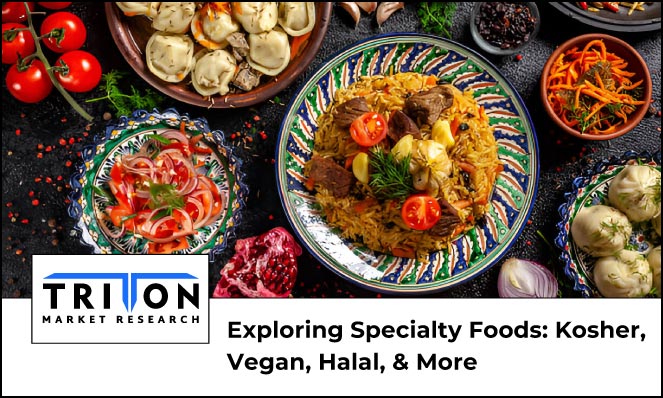



29, July 2024

Specialty foods encompass unique, high-quality items tailored to specific dietary needs and preferences or cultural traditions, adhering to strict guidelines in ingredients, preparation, and consumption. As per the Specialty Food Association (SFA), interest in specialty foods has surged, with US sales reaching $207 billion in 2023, an increase of 149% over the decade. Projections suggest sales will hit $221.5 billion in 2024, growing at a 5.4% annual rate through 2027. This trend is reshaping the food industry, expanding product diversity and dining options. Understanding these dietary nuances is crucial in today’s food industry.
This blog explores four key specialty diets: kosher, halal, vegan, and vegetarian, each influential with unique guidelines and cultural significance.
In today’s globalized world, the appeal of specialty foods transcends mere sustenance, weaving intricate tapestries of culture, tradition, and identity. Specialty foods, in particular, are celebrated for their unique ingredients, preparation methods, and the stories they tell.
Kosher foods, rooted in Jewish dietary laws (kashrut), emphasize purity and adherence to religious traditions. These laws dictate strict separation of meat and dairy, extending to utensils, based on biblical injunctions. Only certain animals, like cloven-hoofed mammals and fin-scaled fish, are considered kosher, slaughtered humanely in a ritual known as shechita. Recently, kosher cuisine has surged in popularity, with innovations ranging from food trucks to upscale restaurants. Chefs are creatively reinterpreting traditional dishes with modern twists, introducing gourmet challah, kosher sushi, and fusion dishes that blend global flavors while respecting kosher food principles.
For instance, Israel’s widespread demand for kosher foods extends beyond religious communities. This is evident in Israir Airlines’s introduction of vacation packages that feature hotels offering kosher breakfasts.
Halal food adheres strictly to halal dietary guidelines, emphasizing ethical treatment of animals and avoidance of certain substances. Permissible animals like cattle, sheep, goats, and chickens are chosen for consumption, slaughtered via dhabihah—a process invoking Allah’s name and ensuring a swift, humane death. Alcohol and intoxicants are strictly prohibited, extending to food preparation. Modern halal offerings include a variety of dishes from burgers to gourmet kebabs, often certified organic and health-focused.
Fusion cuisine blends traditional halal flavors with global culinary trends, introducing innovative dishes like halal Korean BBQ and halal Mexican tacos, enriching the culinary landscape with diversity and flavor. In 2024, KFC Canada’s Muslim division introduced halal menu options at all outlets across Ontario, excluding Thunder Bay and Ottawa.
Some of the widespread types of vegetarian diets are Ovo-Vegetarian, Lacto-Vegetarian, and Lacto-Ovo Vegetarian.
- Lacto-vegetarian diets include dairy products but exclude meat, poultry, fish, and eggs. Dairy intake provides essential nutrients such as calcium, vitamin D, and protein vital for bone health.Well-planned vegetarian diets offer significant health benefits, reducing risks of heart disease, hypertension, type 2 diabetes, and certain cancers. Emphasizing fruits, vegetables, whole grains, nuts, and seeds provides essential nutrients like dietary fiber, antioxidants, and phytochemicals, promoting overall health and longevity. However, attention to key nutrients is crucial. Plant-based proteins such as beans, lentils, tofu, and quinoa, along with fortified foods or supplements for vitamin B12 and careful iron and calcium management, ensure nutritional adequacy. The comprehensive vegetarian health benefits extend beyond disease prevention to supporting sustainable weight management and improving overall well-being.
Vegan diets, in contrast to vegetarian diets, exclude all animal products, including dairy, eggs, and honey, driven by ethical concerns for animal welfare and environmental impact. While both diets center on plant-based foods, vegans must meticulously plan to replace nutrients typically sourced from animal products. Vitamin B12, essential for nerve function and red blood cells, requires supplementation as it is absent in plant foods. Non-heme iron from plants is less readily absorbed, necessitating an iron-rich diet paired with vitamin C for absorption. Vegans often obtain calcium and vitamin D from fortified plant milks and sunlight.
As consumer awareness of health and ethical considerations grows, niche dietary specialties are gaining popularity for their perceived benefits.
The Paleo diet, known as the ‘caveman diet,’ focuses on foods available to early humans: lean meats, fish, fruits, vegetables, nuts, and seeds, while avoiding processed foods, legumes, grains, and dairy. Advocates believe this approach can improve digestion and reduce chronic disease risks.
The Ketogenic (keto) diet is a high-fat, low-carbohydrate plan that aims to induce ketosis, shifting the body’s energy source from glucose to fat. This change is thought to aid weight loss, enhance mental clarity, and boost energy levels by emphasizing meats, fatty fish, eggs, nuts, seeds, and low-carb vegetables while limiting sugars, grains, and most fruits.
The Gluten-free diet, essential for those with celiac disease or gluten sensitivity, has also become popular for improving digestive health and reducing inflammation. It excludes gluten-containing grains like wheat, barley, and rye, opting for alternatives such as rice, quinoa, and corn, along with fruits, vegetables, meats, and dairy.
A plant-based diet focuses on whole, minimally processed plant foods like fruits, vegetables, legumes, nuts, seeds, and whole grains, with occasional inclusion of small amounts of animal products.
Shopping for specialty foods presents both excitement and challenges. It is crucial to navigate the array of specialty food labels and certifications to make informed choices. Kosher certification, denoted by symbols like OU (Orthodox Union) or Kof-K, ensures compliance with Jewish dietary laws. Halal certification, such as from the Islamic Food and Nutrition Council of America (IFANCA), guarantees adherence to Islamic dietary guidelines, emphasizing humane animal treatment and avoiding forbidden substances like pork and alcohol. Vegan certification from organizations like Vegan Action or The Vegan Society, confirms products are free from animal-derived ingredients and not tested on animals.
Avoiding common pitfalls in specialty food shopping is essential for making informed choices. Not all labels are equal; terms like ‘natural’, ‘organic,’ and ‘healthy’ can be misleading without credible certifications like the USDA Organic seal. It is essential for consumers to check for verified labels to ensure authenticity by checking ingredient lists and expiry dates, especially on preservative-free items.
Innovations in specialty foods are revolutionizing the culinary world, offering a wealth of diverse and exciting options. Plant-based meat substitutes now closely mimic traditional meat, catering to health-conscious and eco-friendly consumers. Functional foods fortified with probiotics and antioxidants are gaining popularity for their added health benefits, while lab-grown meat, allergen-free alternatives, and novel ingredients from global cuisines are expanding the scope of the specialty food industry. Moreover, eco-friendly packaging and sustainable sourcing practices appeal to environmentally conscious shoppers, making it easier to find high-quality, nutritious, and ethically produced foods that align with various dietary preferences and values.

Prevalent cases of terrorist attacks in today’s world is increasing the need for severe standards of security for public safety, and the global market for biometric technology scrupulously accommoda..
Prevalent cases of terrorist attacks in today’s world is increasing the need for..